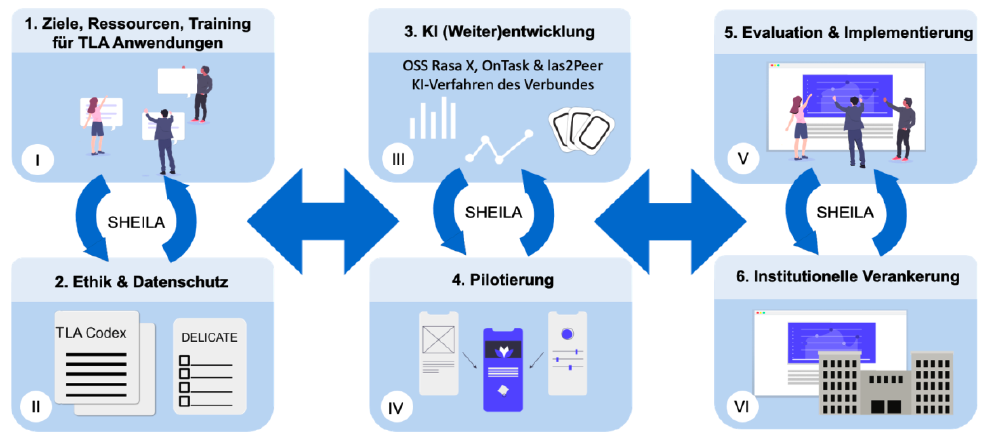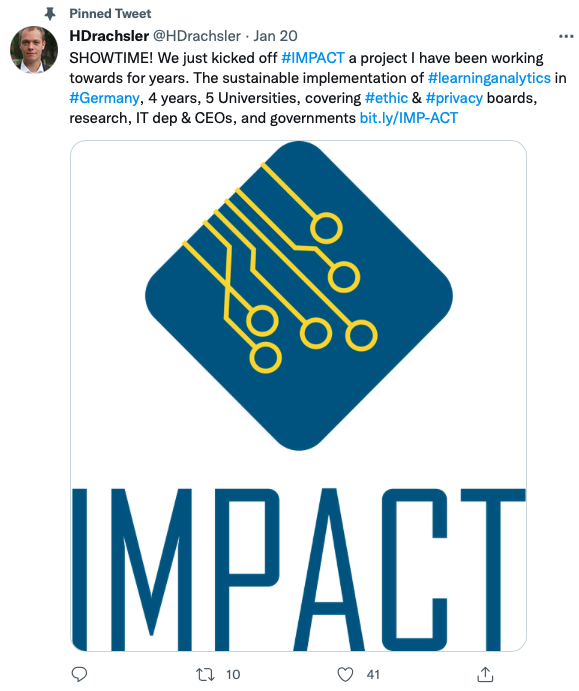Higher Education with Artificial Intelligence
Projekt IMPACT: Implementation of AI-based Feedback and Assessment with Trusted Learning Analytics in Higher Education Institutions
The collaborative project “Implementation of AI-based Feedback and Assessment with Trusted Learning Analytics in Higher Education Institutions” will be carried out by the Goethe University together with the Humboldt University Berlin, the Hagen University, the Freie Universität Berlin and the University of Bremen. Prof. Hendrik Drachsler, Professor of Computer Science with a focus on Educational Technologies at the DIPF and the Goethe University, is the collaborative leader and is also responsible for the Frankfurt sub-project “AI in the study entry phase for summative assessment and feedback as well as piloting, evaluation & implementation, dissemination”.
Responsible management of student data
In the joint project IMPACT, five universities will work together that have special expertise in the area of ethical, legal and social implications (ELSI) and also practical experience in the didactical use of learning analytics. Students are to receive so-called “highly informative and personalized feedback” (HIF) at the various stages of their studies – as prospective students and new students, during the course of their studies, and at the completion of academic achievements – based on the studies of the renowned New Zealand educational scientist John Hattie. According to Hattie, the art of feedback is linked to being able to give and receive feedback at the same time.
Hendrik Drachsler explains the basic principle of learning analytics as follows: “Within the framework of learning analytics, student data is collected and analyzed in order to support students in achieving their study goals and to contribute to the improvement of teaching. The use of learning analytics has hardly been realized at German universities so far. It is therefore necessary to create an understanding of the added value that learning analytics can offer to German higher education.” Mr. Drachsler emphasizes that guiding principles must additionally be defined to create a clear framework for the responsible and ethical use of learning analytics and the handling of student data. “We refer to such responsible and ethical implementation of learning analytics as trusted learning analytics.”

The ChatBot knows the answers
In the IMPACT project, explains Mr. Drachsler, open-source software solutions and preliminary work already established at the participating universities will be combined and put to use. In the process, rapidly growing data sets can be analyzed using AI and converted into personalized “highly informative personalized feedback.” For example, students can be given low-threshold advice as needed in the Student Orientation and Entrance Period (SOEP); they will benefit to a far greater extent from the volumes of data analyzed in advance than would be possible in the form of personal support. “We expect that chatbots can be helpful support systems in the future and can be relevant information about the respective university, as well as about the respective student topic,” notes Drachsler. GUDI, for example, is a chatbot of Goethe University that knows the answers to many essential questions, such as semester dates, contact persons and services offered by the university. The ChatBot constantly learns from the questions asked by users and is expanded with additional knowledge. It should be noted that chats with GUDI are stored anonymously and no conclusions can be drawn about individuals.
Relieving the burden on teachers
But what does the use of AI in university teaching mean for the role and self-image of the lecturer? Hendrik Drachsler emphasizes that lecturers will continue to be needed for high-quality teaching. “However, we can use AI to provide feedback, especially in large courses, faster and to more students than can be provided by a lecturer and corresponding tutors. AI will also be very helpful in evaluating exams and saving time. In the IMPACT project, we will explore to what extent, for example, free-text entries in exams can be classified by AI. This is because free-text assignments are a popular way for many students to express what they’ve learned, but grading them is very time-consuming and resource-intensive.” Particularly with larger cohorts, Drachsler said, AI applications could take some of the burden off instructors; learning processes would be supported beyond courses. Individual student support through Trusted Learning Analytics, he said, leads to students becoming more engaged with learning objectives, requirements and assessment criteria, and developing an understanding themselves of what action strategies conducive to learning look like.
Institutional embedding
Digitization plays a central strategic role at all participating university locations. Therefore, AI-based teaching and learning innovations will be incorporated into the quality management for teaching, student advising and further development of study programs; the respective vice presidents for teaching and studies as well as the chief information officers are involved. Also involved are supporting institutions for digital teaching (at the Goethe University studiumdigitale) and the departments responsible for human resources development. Furthermore, at the Goethe University, the results of the IMPACT project will be passed on to the state universities as part of the Hessian DigLL network (Digitally Supported Teaching and Learning in Hesse).
Artificial intelligence (AI) in university teaching is being intensified at four universities in Hesse thanks to funding from the federal government and the state of Hesse: Projects at the Goethe University Frankfurt, the Kassel University, the Frankfurt University of Applied Sciences and the Offenbach University of Applied Sciences have been selected for funding from the federal-state program “AI in Higher Education.” They will receive a total of 6.6 million euros until 2025. This was announced by the Joint Science Conference (GWK) in June 2021.
The Goethe University Frankfurt is at the start with two projects. The joint project “Implementation of AI-based Feedback and Assessment with Trusted Learning Analytics in Universities” (IMPACT) will be carried out by the Goethe University together with the Humboldt-Universität zu Berlin, Fernuniversität Hagen, Freie Universität Berlin and the University of Bremen. Also involved at the Frankfurt location are: Prof. Dr. Holger Horz, Institute of Psychology – Central Institution Interdisciplinary College of Higher Education Didactics (IKH) and Educational Psychology, focus on Psychology of Teaching and Learning in Adulthood; Prof. Dr. Andreas Frey (Educational Psychology, focus on Counseling, Diagnostics & Evaluation);
In the second Frankfurt project “AI and digital Technology in Learning and Instruction” (ALI), an interdisciplinary study program on the use of AI and digital technologies in educational processes is being developed under the direction of Prof. Holger Horz (see also presentation of the project in UniReport 5/2021).

